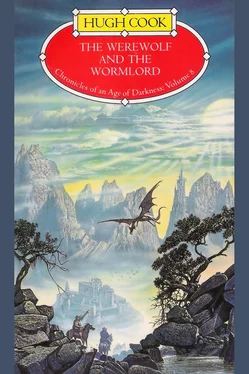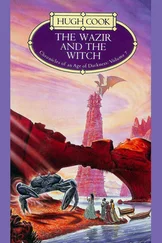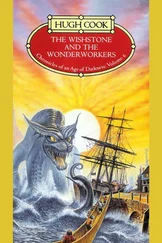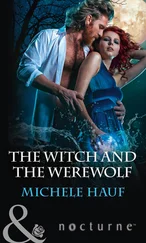Hugh Cook - The Werewolf and the Wormlord
Здесь есть возможность читать онлайн «Hugh Cook - The Werewolf and the Wormlord» весь текст электронной книги совершенно бесплатно (целиком полную версию без сокращений). В некоторых случаях можно слушать аудио, скачать через торрент в формате fb2 и присутствует краткое содержание. Жанр: Фэнтези, на английском языке. Описание произведения, (предисловие) а так же отзывы посетителей доступны на портале библиотеки ЛибКат.
- Название:The Werewolf and the Wormlord
- Автор:
- Жанр:
- Год:неизвестен
- ISBN:нет данных
- Рейтинг книги:5 / 5. Голосов: 1
-
Избранное:Добавить в избранное
- Отзывы:
-
Ваша оценка:
- 100
- 1
- 2
- 3
- 4
- 5
The Werewolf and the Wormlord: краткое содержание, описание и аннотация
Предлагаем к чтению аннотацию, описание, краткое содержание или предисловие (зависит от того, что написал сам автор книги «The Werewolf and the Wormlord»). Если вы не нашли необходимую информацию о книге — напишите в комментариях, мы постараемся отыскать её.
The Werewolf and the Wormlord — читать онлайн бесплатно полную книгу (весь текст) целиком
Ниже представлен текст книги, разбитый по страницам. Система сохранения места последней прочитанной страницы, позволяет с удобством читать онлайн бесплатно книгу «The Werewolf and the Wormlord», без необходимости каждый раз заново искать на чём Вы остановились. Поставьте закладку, и сможете в любой момент перейти на страницу, на которой закончили чтение.
Интервал:
Закладка:
To be precise, Banker Eg was making his way to Vamvelten Street with malice in his mind. When he arrived at Alfric Danbrog’s house, he knocked on the door. Viola Vanaleta admitted him, and they were soon deep in conversation. About Alfric.
‘Let me not prevaricate,’ said Eg. ‘Rather, let me settle to business immediately. And let me be honest with you. It is said that a resilient conscience, a yielding conscience, is an asset in a Banker. But, despite the odium we have long endured, we are not all of us possessed of easily mutable ethics. Lies and distortions come not easily to all of us, least of all to me. So let me be truthful.’
‘Is — is Alfric in trouble?’ said Vanaleta.
‘My sweet and delectable Viola!’ said the Banker. ‘Fear not for the valorous Danbrog.’
Whereupon Vanaleta, like a timid maiden who fears to be defrauded of her virginity, began to be apprehensive on her own account.
But, after many circumlocutions, Eg disabused her of the notion that she was intended as his prey. Instead, he came up with something much more shocking:
‘What are you trying to tell me?’ said Vanaleta.
‘Alfric,’ said Eg, ‘has a chance to marry Ursula Major and so acquire the throne.’
‘But — but he can’t!’ said Vanaleta. ‘He’s married to me.’
‘I know,’ said Eg gently.
‘Besides, it — it’s — it’d be incest.’
‘Such things are commonplace in royal families,’ said Banker Eg, ‘personal sin often being preferred to the disintegration of the body politic. Alfric recognizes as much.’
‘You — you mean he-’
‘He demands,’ said Eg, ‘a divorce.’
CHAPTER SEVEN
Alfric was rigorously quarantined by the Bank until he rode forth on the first of his three quests. Therefore his darling wife Viola Vanaleta was not able to tax him about the divorce he was demanding; and, indeed, Alfric for his part presumed himself still happily married.
Such was the state of affairs as Alfric Danbrog, son of Grendel Danbrog and grandson of Tromso Stavenger, rode out through the Stanch Gates. He was fated north to the island of Thodrun, there to dare the sea dragon Qa, to kill that dreaded worm and remove the revenant’s claw from the monster’s barrow.
Alfric was not entirely happy with this mission, for, quite apart from the dangers that were involved, the idea of being renowned for the murder of a famous bard did not exactly appeal to him. Qa was such a bard, a singer of songs, a praiser of kings, a recorder of heroes, a skop whose fame had once exceeded that of Greta Jalti himself.
It happened that the sea dragon Qa had once dwelt in Galsh Ebrek, there winning great fame as a poet. But tastes change.
Here the tastes in question are not those of the audience but of the artist. Long had Galsh Ebrek rejoiced in sagas of butcher-sword brutality; and the appetite for such epics remained constant. But Qa, at first a willing appeaser of such tastes, had at last grown bored with the composition of such bloodclot confectionery.
The dragon’s ennui had first been displayed at a formal banquet at which, in place of the usual paean of praise to some head-hacking reaver, the poet had recited a narrative poem dealing with the lethal outcome of a drinking competition. Qa had expended some five thousand lines of terza rima on this theme. It had proved an acceptable novelty. Thereafter, the dragon had amused himself for the better part of a year by much droll doggerelizing on beer drinking competitions and brothel performances; and the Yudonic Knights had come to think of him as quite the best of their poets.
After all, other bards yet retained an interest in organized phlebotomy, and so were happy to compose stanzas about blood-drenched heroes and sword-slaughter armies. So Qa’s diversions into other areas of chivalric culture were tolerated and, for the most part, actively welcomed.
But at last things went sour.
The dragon Qa wore out his interest in booze and brothels, and began to fancy himself as a mystic philosopher. Unfortunately this led him to compose verses of ever-increasing complexity and obscurity which were not at all to the taste of Galsh Ebrek. At one famous banquet, a good three-score Yudonic Knights displayed their scorn for philosophy by throwing things at their draconic skop: old bones, burnt boots, dollops of mud, sklogs of hardened manure and curses by the dozen.
In the days that followed, a much-mocked Qa became morose, then bad-tempered; then so forgot his manners as to begin to eat people. First the dragon had devoured a wood-cutter; then a couple of beggars; and after that a ferryman. Such peccadillos had been tolerated for a time, for the Yudonic Knights knew that artists are not as other people, and some allowance must be made for their occasional deviation from accepted standards of behaviour. Providing the people who were eaten were mere commoners, nobody was going to get too upset about it. (Except the friends and relations of such commoners — but they, they didn’t really count.)
However, on one fine night in high summer, the dragon Qa had got more than a little drunk and had eaten of the flesh of the Wormlord’s latest wife, a child no more than eleven years of age. Then Qa had fled — knowing that he had gone too far. Such was the wrath of the ruler of Saxo Pall that he had ordered a dozen of his knights to do a critical demolition job upon the reckless firedrake. Armed with swords, those heroes had set forth in hot pursuit. But Qa had ambushed them in a gully much overgrown with trees. These the dragon had set alight, and all the marauding Knights had been burnt alive.
Out of vanity, Qa had attempted to eat the lot. But biological limitations had defeated wilful gluttony, so in the end the dragon had been forced to leave a few bones and much-crunched skulls for the heroes’ heirs and assigns to bury. However, while some such physical fragments had been left, the bloated and unrepentant sea dragon had made off with the ironsword Edda; the loss of which had been ever afterwards lamented in Galsh Ebrek.
For some time, nothing had been heard of the dragon; until at length it was learnt that Qa had taken up residence on Island Thodrun. Whereupon many heroes had been eager to close with the monster and exact revenge for the ghastly murders it had committed. But the Wormlord, declaring he could not afford to lose his Knights a dozen at a time, had ruled that none could quest against the dragon without royal permission. Anyone granted such permission must go alone, armed with only a sword.
Over the years, many of the brave and the beautiful had dared the attempt; and one and all had met with universal disaster.
In keeping with the Wormlord’s law, the new champion rode forth alone with no bosom-comrades to stand by him in battle. Like those who had gone before him, Alfric Danbrog carried a sword. But he was confident of victory, for he was a Banker Third Class, and hence surely able to outwit a mere firedrake.
A full league short of Island Thodrun, Alfric left his horse in a grove of trees standing amidst the sand dunes. Anna Blaume would be most upset if her dearest Nodlums got eaten by a dragon; and, besides, Alfric wanted to preserve the beast in good health so it could carry a hearty load of dragon-treasure back to Galsh Ebrek.
‘So long, horse,’ said Alfric, giving the creature a perfunctory pat which was meant to be friendly.
Then the banker shouldered his pack, which was very heavy, and set forth along the beach, striding out to warm himself, for the night was bitterly cold. Though it was night, the bright beacon of Thodrun gave him more than enough light to see by. Thodrun’s beacon was ancient, as old perhaps as the Oracle of Ob; but no legends surrounded it. All presumed it had served the ancients as a seamark, and thus it was used in Alfric’s day. It was a globe of cold fire which sat atop a skeletal pyramid of a metal immune to corrosion; and it lit all around with a light greater than that of a full moon.
Читать дальшеИнтервал:
Закладка:
Похожие книги на «The Werewolf and the Wormlord»
Представляем Вашему вниманию похожие книги на «The Werewolf and the Wormlord» списком для выбора. Мы отобрали схожую по названию и смыслу литературу в надежде предоставить читателям больше вариантов отыскать новые, интересные, ещё непрочитанные произведения.
Обсуждение, отзывы о книге «The Werewolf and the Wormlord» и просто собственные мнения читателей. Оставьте ваши комментарии, напишите, что Вы думаете о произведении, его смысле или главных героях. Укажите что конкретно понравилось, а что нет, и почему Вы так считаете.












